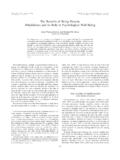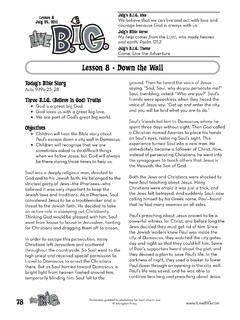Transcription of What is moral courage? Definition, explication, and ...
1 8 What Is moral courage ? Definition, explication , and Classification of a Complex ConstructSilvia Osswald, Tobias Greitemeyer, Peter Fischer, and Dieter FreyNothing demands more courage and character than to be in open oppositionto time and mainstream, to stand up and to say aloud: No! Kurt Tucholsky, in Frohloff (2001, p. 231)Consider the following two instances of prosocial behavior. The first took place inMunich, Germany, January 13, 2001: About 20 Nazi skinheads harassed a youngGreek and started to beat him up in a most brutal way. Five young Turks wit-nessed the situation and decided to intervene. Risking their own lives, they wereable to save the disabled and blood-stained victim from being beaten to second instance occurred in Asia: After the big tsunami wave in SoutheastAsia in December 2004, more than 165,000 people lost their lives and more thanone million people were made homeless by the floods.
2 Shocked by this horriblenatural disaster, people all over the world wanted to ease the victims of volunteers went to Southeast Asia to help on the ground and inGermany, for example, more than 250 million Euros were collected in privatedonations to help the tsunami young Turks and the tsunami volunteers and donors both acted pro-socially and supported people who were in situations of severe distress. However,in the first situation, the young Turks had to reckon with massive negative socialconsequences such as being assaulted by the Nazi skinheads or at least beingharassed by them. In contrast, the tsunami volunteers and donors could antici-pate positive social consequences such as gratefulness from the victims andrecognition from other volunteers, other donors, and the public.
3 Thus, evenif both types of actions are done in pursuit of the same goal, namely, helping per-sons in need, the consequences for the helper might be very different. We arguethat the first kind of prosocial behavior is a typical instance of moral courage ,whereas the second is more typical of helping chapter deals with moral courage . We seek to highlight this construct bycomparing it with other prosocial behaviors, such as helping behavior and relatedconstructs such as heroism or social control. We also include research 4/23/10 4:13 PM Page 149classical determinants of helping behavior that do not affect moral courage , fol-lowed by studies about determinants that foster moral courageous for moral courage as well as scales to measure it are presented. Finally,we discuss a practical implementation of our research: moral courage moral CourageIn this chapter we use the term moral courageas a synonym for civil courage (seeGreitemeyer, Osswald, Fischer, & Frey, 2007).
4 Both terms refer to the Germanword courage is a prosocial behavior with high social costsand no (or rare) direct rewards for the actor ( , Bierhoff, 2002). In situationsthat demand a morally courageous intervention, instances of injustice happen,human rights are violated, persons are treated unfairly and in a degradingmanner, or nature and cultural assets are in danger; these situations are aboutdiscrimination against foreigners or other minorities, violence and aggressionagainst weaker individuals, sexual harassment or abuse, mobbing, or illegal busi-ness practices (Frey, Schaefer, & Neumann, 1999). Lopez, O Byrne, and Petersen(2003) defined moral courage as the expression of personal views and valuesin the face of dissension and rejection (p. 187) and when an individual standsup to someone with power over him or her ( , boss) for the greater good (p.)
5 187). Thus, often an imbalance of power exists with a disadvantage on the sideof the person who acts morally courageously. moral courage situations (com-pared with other situations that demand prosocial behavior) are also charac-terized by a specific social constellation: There are not only one or more victimsbut also one or more perpetrators who discriminate against the victim(s) or actunfairly or threateningly, and the potential helper has to deal with the perpe-trators to act prosocially (Jonas & Brandstaetter, 2004). Most of the social costsmoral courage entails emanate from the confrontation with the , Fischer, Kastenmueller, and Frey (2006) defined moral courageasbrave behavior accompanied by anger and indignation, which intends to enforcesocietal and ethical norms without considering one s own social costs.
6 Social costs( , negative social consequences) distinguish moral courage from other pro-social of studies have addressed prosocial behavior ( , PsycINFO lists428 entries from 2007 with the term prosocial behaviorin the title), but very lit-tle research has referred to prosocial behavior with high (social) costs for theactor ( , the person who helps). The reason for this seems obvious, as high-costprosocial behavior is difficult to examine in a laboratory. Indeed, it is very diffi-cult to generate respective situations that can take place in the laboratory and donot appear artificial. Furthermore, ethical considerations prohibit an exposure ofsubjects to danger or to unreasonable psychological stress. Therefore, the fewstudies that deal with costly prosocial behavior question people ex post ( ,Becker & Eagly, 2004; Oliner & Oliner, 1988).
7 150 OSSWALD ET courage overlaps with bystander intervention. In our opinion, moral courage includesbystander intervention but is more broadly 4/23/10 4:13 PM Page 150 One subtype of high-cost prosocial behavior, namely, intervening at the riskof high social costs and with no or only little hope for reward ( , moral courage ),has been neglected for the most part. This neglect is astonishing in light of theimportance of moral courage for democracy and society (Ostermann, 2004). Areason for the relatively few studies about moral courage might be that previ-ous research and theorizing on prosocial behavior did not distinguish betweenmoral courage and other prosocial behaviors, especially helping behavior (Batson,1998); thus, predictors of helping behavior have also been regarded as predictorsof moral courage .
8 Recent studies and theoretical considerations, however, sug-gest that moral courage should be separated from other prosocial behaviors. Thisis treated in the following and Differences Between moral courage and Other Prosocial ConceptsIn this section we discuss relations of moral courage to other prosocial this connection, we focus on helping behavior, heroism, and social Between moral courage and Helping Behavior: The Role of Negative Social ConsequencesAs already mentioned, the anticipated negative social consequences in case ofprosocial action distinguish moral courage from other prosocial behaviors. Forhelping behavior, positive consequences, such as plaudit or acknowledgment,can be expected. moral courage , however, can result in negative social conse-quences, such as being insulted, excluded, or even attacked.
9 Of course, helping ordonating could also lead to negative consequences for the help giver ( , losingtime or money) but not to negative social consequences. Several studies tried toprove the distinction between moral courage and helping behavior et al. (2004; see also Greitemeyer et al., 2007) investigated whetherlaypeople anticipate more negative social consequences of moral courage thanthey do of helping behavior. In a vignette study, participants read descriptions ofdifferent situations with varying negative social consequences ( , the perpetra-tors were described as very terrifying or quite harmless). Results revealed thatthe more severe the social consequences were, the more participants character-ized the relevant behavior as moral courage (and less as helping behavior).Subsequently, Greitemeyer, Fischer, Kastenmueller, and Frey (2006) moreclosely examined people s implicit theories about moral courage and comparedthem with implicit theories of helping behavior, because implicit theories arecrucial in a decision to engage in any kind of prosocial behavior (Dweck, Chiu, &Hong, 1995).
10 If people s implicit theories of moral courage and helping vary, thentheir decisions on whether to engage in moral courage will follow the applicationof different standards. In the first study of Greitemeyer et al. (2006), partici-pants read a vignette in which a bystander witnessed a person in need whowas threatened and attacked by an offender. Similar to the results of thealready mentioned study of Fischer et al. (2004), expected negative social conse-quences were manipulated by varying the extent to which the offender appearedWHAT IS moral courage ? 4/23/10 4:13 PM Page 151threatening. Participants learned that the actor intervened and stopped theattack, and then had to indicate to what extent they perceived the actor s behav-ior to be moral courage and helping behavior, respectively.






